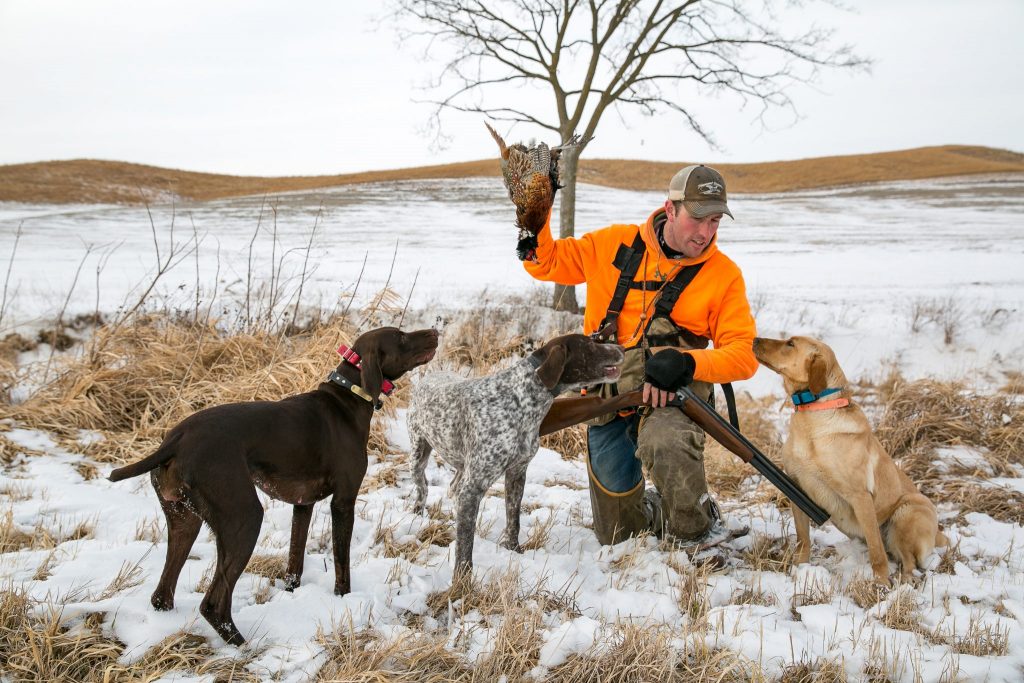
Story and photos by Jenny Nguyen-Wheatley
Aaron Schroder lives in Lyons, Nebraska, with his wife, four dogs and two horses. He drives a truck, appreciates cheap beer, and enjoys spending time in his “man cave” – though he probably doesn’t like to call it that. Hunting gear takes up nearly all the extra space on the Schroder property, and when the season is in full swing, his wife, April Goettle, rarely sees him. You may think you know an Aaron – or two or several – in your life, but meet the real man, and you can’t help but do a double take.
There’s no missing the weird cat tattoo and the slick-backed, rockabilly hair. That speech – definitely not Midwestern. Aaron doesn’t seem like someone who’s from around here, let alone someone who would take you on your first pheasant hunt. Yet Lyons is only 20 miles from Onawa, Iowa, where he was born and where his parents still live. Aaron is different because he missed 20 years of living here.
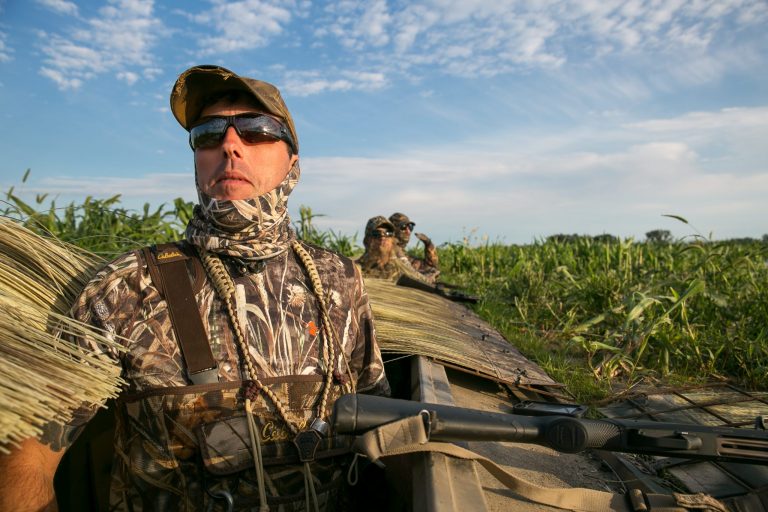
“Everything I do I’m obsessive about, it seems,” said Aaron, now 44 years old. “It’s just how I am.” His wife can attest to this behavior.
Enticed by the “opportunity to leave [home] and go do something,” Aaron left Iowa at 18 to play rock music in Seattle. He worked at his birth mother’s restaurant during the day and played music at night. He met April through a musicians-wanted ad.
“We would work and then spend 3 or 4 hours a day practicing. It was a big commitment,” Aaron said, “I toured and made money, had a record deal.” For 12 years, this was Aaron’s life in Seattle.
Then an opportunity to go to New York presented itself, and Aaron and April moved to Brooklyn to continue to play music professionally. The restaurant business was always there by default – the band toured as much as six months out of the year – and it was the kind of job that suited a musician’s schedule. For a time, Aaron worked at Mario Batali’s Lupa.
“So many people opened up doors and we continued to play,” Aaron said. “I remember we were touring in Scotland, and some musicians from Germany were discussing why we were doing what we were doing. One guy said, ‘It’s just adventure. I want adventure.’ And it just struck me,” Aaron said. “That’s the whole root of why we’re doing this.”
It wasn’t about the money – there was never really much of that. Instead, playing music was a cheap way to travel and be away from work. It was a way to go overseas to “meet interesting people and have crazy experiences.”
Then one day, Aaron walked away. A nearly 20-year obsession – gone.
“I was getting older, and then a light came on,” Aaron said. “Jeez, I was 34 or 35 at the time, and I had been recording and touring since I was 19. When we arrived at JFK, right then, I knew I was done. I took my guitar off the airplane and I was like ‘I don’t need to do this anymore. I feel satisfied.’ ”
After that, Aaron was free to do what he wanted, and around the same time, April finished her classes at Columbia. The couple lingered in New York a while longer to figure out their next move. The pivotal moment came when his father-in-law John called Aaron to go pheasant hunting.
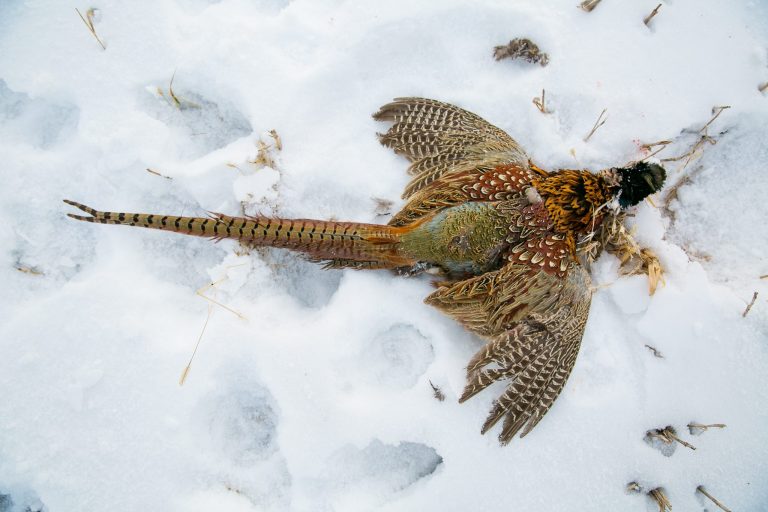
“John is a big outdoorsman and he always called me up to say, ‘take me pheasant hunting in Nebraska,’ but I never did. I grew up hunting in Iowa and had dogs, but stopped when I moved away. I hadn’t done it in such a long time.”
Finally free from a life of band practice and touring, Aaron took up John’s invitation. He called his uncle Donny in Iowa to set up a hunt. John lived in Montana and Aaron was still in New York at the time. The plan was to meet in Omaha for opening day of pheasant season.
Thirteen years ago, the three men went hunting on opening morning in Monona County, Iowa. It was on public ground, the same places Donny took Aaron hunting when he was a boy. Though “stoked” to spend time with family, Aaron admitted to feeling indifferent about the hunt. What he actually felt was unexpected.
“I remember it was a cold autumn morning,” Aaron said. “I put a shell in my shotgun, and suddenly boom – like WHOA. I thought ‘I miss this. I really like this.’ I forgot how much I liked hunting because I’ve been in a completely different environment. At that moment, I was pulled right back into it … We had the worst hunt ever. We didn’t get anything or see anything. And I didn’t care.
“So I flew back to New York, and I just pushed everything else aside – my whole life has been like this. All of a sudden, I was reading and watching videos and wanting to get back into hunting and training dogs. I ended up flying back here four times before my hunting license ran out that year.”
Then Aaron’s dad called to say that an acreage in Nebraska was up for sale. They went to see the house, during the worst snowstorm Burt County has seen in years, and “somehow April still went for it.” Aaron loved the place immediately. They moved to Lyons five months later and picked up Darlin’, a German short-haired pointer puppy, on the drive from New York.
“I had paid for her a month or two before. I had everything laid out, and it was so fun!” Aaron said, barely able to contain his excitement over the memory. “I got this dog in my lap and we’re driving to our new house. I’m thinking, ‘Oh my god! My wife loves me so much!’”
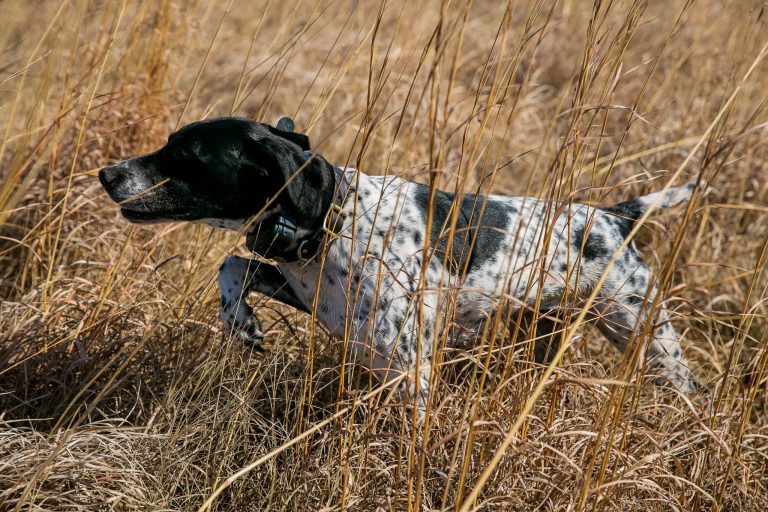
Aaron didn’t have any plans at that point, except to take whatever odd jobs he could to afford his new hobby. Falling back on his restaurant experience, Aaron started as head chef at Pheasant Bonanza in Tekamah, where he introduced clients to wild game dishes that didn’t come from a can. He had no intention of turning hunting into a career, but quickly went from learning to train dogs on the side to becoming trainer and hunting guide full-time. He dove headfirst at the opportunity to train for several months with the renowned John Greer at Tiger Mountain Pointing Labs in Ellensburg, Washington.
Aaron absorbed all he could, with the same obsession and tenacity he had for music. This was his new adventure, and much like his past life as a musician, the unpredictability of hunting and dog training kept his work exciting.
“The two are a balance – dog training and outfitting. You get slammed doing one thing, and get tired of it, and then you switch. It’s like music – playing shows and recording. I can’t do the same thing over and over again,” Aaron said. “With hunting, there are always random occurrences that are fun to deal with, especially when dealing with nature. It doesn’t get any more random than nature.”
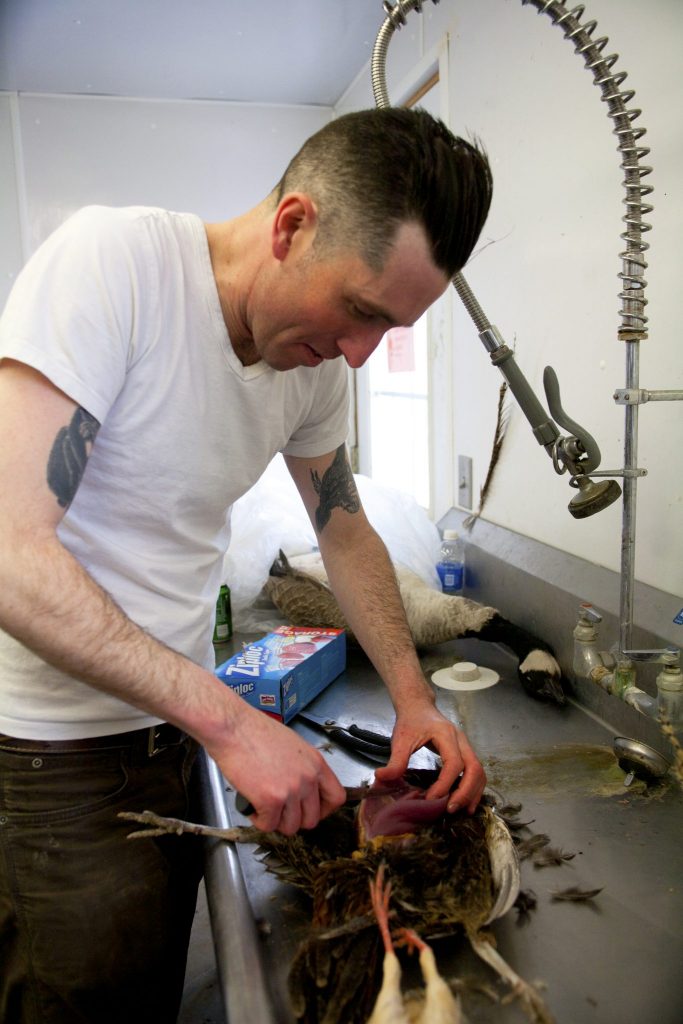
From upland hunting, Aaron then got into waterfowl hunting, which was an entirely new obsession in itself. A few years later, Aaron moved on from Pheasant Bonanza to open his own business: Double A Outfitting and Gun Dogs. It presented new challenges, which he relished.
“The things I really hated about outfitting at first are the things I really like now. Something always breaks. There are so many pieces,” Aaron said. He may get up at 2 or 3 in the morning – whatever it takes – because he assumes that something will always go wrong, and he’s had a few close calls, unbeknownst to customers who show up hours later.
“I dig crazy weather patterns. I really enjoy them. But it makes working difficult when there’s ice involved. If the river could talk,” Aaron said, with a scoff. “Whether the birds show up is one thing, but nobody who comes hunting or dog training with me will ever suffer from any sort of shortcomings because something isn’t working. That can’t happen. In the end, it’s really rewarding when things are how I want them to be.”
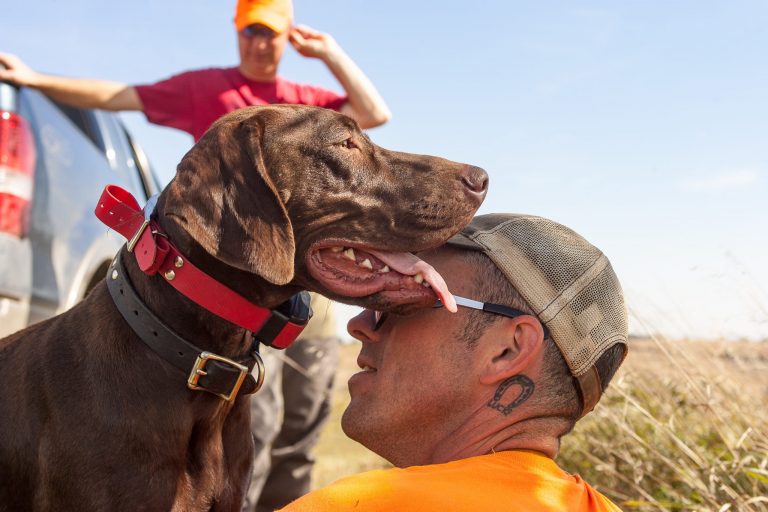
As for wear and tear, life as a hunting guide isn’t a huge upgrade from the days of sleeping on couches and floors. Aaron can put in as many as 90 hours per week during the hunting season. The work is a constant grind, and like many in the profession, he, too, suffers from aches and pains.
“I work by myself on the river a lot and have had some compromising times with the river. I remember sitting out there one morning, really early, and thinking to myself, ‘I’m either really tough or really stupid,’” Aaron said. “I don’t make a lot of money doing this. I could probably make more doing something else, but it’s not the same. You have to like it.”
Sometimes he wonders when he’ll stop guiding. Maybe he’ll take a young hunter under his wing, as others have done for him. “I can just sit, lay down the stories and cook eggs or something. That’s probably how I will go out,” Aaron said, amused at the thought, before he quickly brushed it off. That day isn’t happening anytime soon.
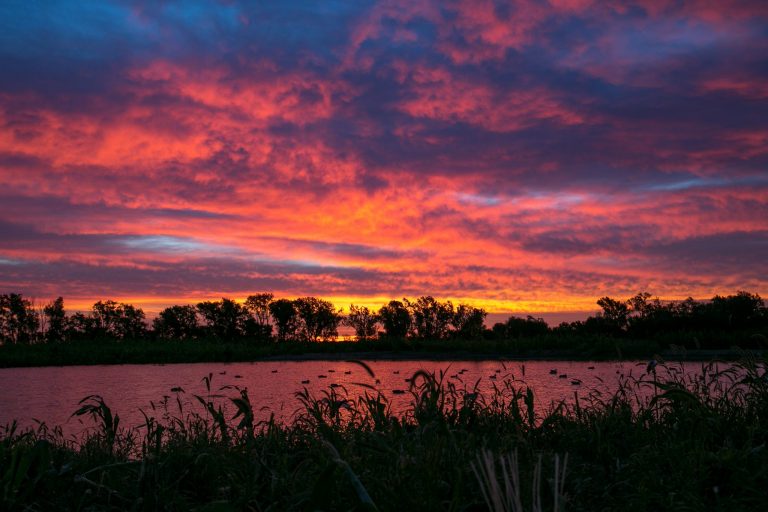
“Those guys that spend 50 years just watching the sky – that’s just so romantic to me, to just watch the years go by like that, watching migrating birds and wildlife in general, and how they’ve adapted to change. These people have such a long perspective over a span of so many years,” Aaron said. “I’m just more interested in it as the years go by. I’ll sit out there for hours and hours, even when nothing is happening, and it’ll seem like only 10 minutes. It’s weird, to sit for hours and hours in one spot for so many years.
“I can’t imagine doing anything else. It’s all I think about. It’s all I want to do. It’s always calling me.”
He isn’t satisfied yet.
